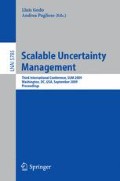Abstract
In this paper we introduce a fixpoint semantics for quantitative logic programming, which is able to both combine and correlate evidence from different sources of information. Based on this semantics, we develop efficient algorithms that can answer queries for non-ground programs with the help of an SLD-like procedure. We also analyze the computational complexity of the algorithms and illustrate their uses.
This work is part of the SILK (Semantic Inference on Large Knowledge) project sponsored by Vulcan, Inc.
Access this chapter
Tax calculation will be finalised at checkout
Purchases are for personal use only
Preview
Unable to display preview. Download preview PDF.
References
Baldwin, J.F.: Evidential support logic programming. Fuzzy Sets and Systems 24(1), 1–26 (1987)
Dekhtyar, A., Subrahmanian, V.S.: Hybrid probabilistic programs. J. of Logic Programming 43, 391–405 (1997)
Dempster, A.P.: Upper and lower probabilities induced by a multi-valued mapping. Ann. Mathematical Statistics 38 (1967)
Dubois, D., Lang, J., Prade, H.: Possibilistic logic. In: Handbook of logic in artificial intelligence and logic programming, nonmonotonic reasoning and uncertain reasoning, vol. 3, pp. 439–513. Oxford University Press, Inc., Oxford (1994)
Grosof, B.N.: A courteous compiler from generalized courteous logic programs to ordinary logic programs. Technical Report Supplementary Update Follow-On to RC 21472, IBM (July 1999)
Kifer, M., Li, A.: On the semantics of rule-based expert systems with uncertainty. In: Gyssens, M., Van Gucht, D., Paredaens, J. (eds.) ICDT 1988. LNCS, vol. 326, pp. 102–117. Springer, Heidelberg (1988)
Kifer, M., Subrahmanian, V.S.: Theory of generalized annotated logic programming and its applications. J. of Logic Programming 12(3,4), 335–367 (1992)
Lakshmanan, L.V.S., Shiri, N.: A parametric approach to deductive databases with uncertainty. IEEE T. Knowledge and Data Engineering 13(4), 554–570 (2001)
Lukasiewicz, T.: Probabilistic logic programming with conditional constraints. ACM Trans. on Computational Logic 2(3), 289–339 (2001)
Muggleton, S.: Learning stochastic logic programs. Electron. Trans. Artif. Intell. 4(B), 141–153 (2000)
Ng, R.T.: Reasoning with uncertainty in deductive databases and logic programs. Intl. J. of Uncertainty,Fuzziness and Knowledge-Based Sys. 5(3), 261–316 (1997)
Ng, R.T., Subrahmanian, V.S.: A semantical framework for supporting subjective probabilities in deductive databases. J. of Automated Reasoning 10(2), 191–235 (1993)
Pearce, D., Wagner, G.: Logic programming with strong negation. In: Proceedings of the international workshop on Extensions of logic programming, pp. 311–326. Springer-Verlag New York, Inc., New York (1991)
Poole, D.: The independent choice logic and beyond. In: Probabilistic Inductive Logic Programming, pp. 222–243 (2008)
De Raedt. L, Kersting, K.: Probabilistic inductive logic programming. In: Probabilistic inductive logic programming, pp. 1–27 (2008)
Saad, E., Pontelli, E.: Towards a more practical hybrid probabilistic logic programming framework. In: Hermenegildo, M.V., Cabeza, D. (eds.) PADL 2004. LNCS, vol. 3350, pp. 67–82. Springer, Heidelberg (2005)
Sato, T., Kameya, Y.: Parameter learning of logic programs for symbolic-statistical modeling. J. of Artificial Intelligence Research 15, 391–454 (2001)
Shafer, G.: A Mathematical Theory of Evidence. Princeton University Press, Princeton (1976)
Shenoy, P.P., Shafer, G.: Axioms for probability and belief-function propagation. In: Uncertainty in Artificial Intelligence, pp. 169–198. North-Holland, Amsterdam (1990)
Shortliffe, E.H.: Computer Based Medical Consultations: MYCIN. American Elsevier, Amsterdam (1976)
Subrahmanian, V.S.: On the semantics of quantitative logic programs. In: Symposium on Logic Programming (SLP), pp. 173–182 (1987)
Wan, H., Grosof, B.N., Kifer, M., Fodor, P., Liang, S.: Logic programming with defaults and argumentation theories. In: Intl. Conf. on Logic Programming (2009)
Wan, H., Kifer, M.: Belief logic programming: Uncertainty reasoning with correlation of evidence. In: Intl. Conf. on Logic Programming and Nonmonotonic Reasoning, LPNMR (2009)
Zadeh, L.A.: Fuzzy sets. Information Control 8, 338–353 (1965)
Author information
Authors and Affiliations
Editor information
Editors and Affiliations
Rights and permissions
Copyright information
© 2009 Springer-Verlag Berlin Heidelberg
About this paper
Cite this paper
Wan, H., Kifer, M. (2009). Query Answering in Belief Logic Programming . In: Godo, L., Pugliese, A. (eds) Scalable Uncertainty Management. SUM 2009. Lecture Notes in Computer Science(), vol 5785. Springer, Berlin, Heidelberg. https://doi.org/10.1007/978-3-642-04388-8_21
Download citation
DOI: https://doi.org/10.1007/978-3-642-04388-8_21
Publisher Name: Springer, Berlin, Heidelberg
Print ISBN: 978-3-642-04387-1
Online ISBN: 978-3-642-04388-8
eBook Packages: Computer ScienceComputer Science (R0)

